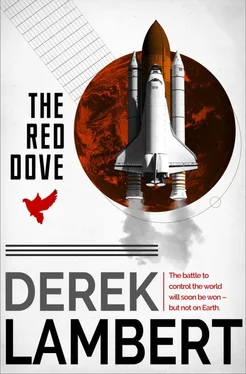From the same pocket he produced a photostat of an official document emanating, Talin noted, from the Science Policy Research Division, Congressional Research Service, Library of Congress.
‘This,’ Massey said, ‘was to have been the damning evidence. Since then other material has come to light. But read this first.’
He slid the photostat across the table under the Dove blueprint. Talin’s initial calmness was now followed by a series of shocks as sharp as pistol shots spaced out by a marksman.
The photostat was an extract from a report on the Soviet Union’s space programme. The extract dealt with Doves. One paragraph had been underlined.
It is reliably understood that the stations constructed in orbit by cosmonaut craftsmen carried into space by Dove shuttles could be used to generate radiation on to selected areas of the earth’s surface. In this way the Soviet Union, using equipment manufactured at Sarova, could annihilate the populations of hostile countries and, when the radiation threat had receded, occupy its unscathed cities and countryside.
Talin thought: ‘Doves of Peace used for genocide? Ridiculous. Laughable.’ Then he thought: ‘What was it about the Dove that struck me as different?’
He said to Massey: ‘You’re a spy, of course.’
‘Not a spy. An agent.’
‘I think sub-consciously I always knew.’
‘It’s irrelevant anyway. What matters is our beliefs. That’s why I came to Russia.’
‘And your masters, do they share our beliefs?’
‘Not in the same way. But they do believe that power criminally used in space will destroy the future.’
‘Why should I believe this piece of paper?’ sliding it back under the blueprint.
‘I had no reason to fake it.’
‘But the CIA – I suppose that’s who you’re working for – they would have had reason.’
Massey said: ‘I’m being honest. Yes, I suppose they could have faked it. Anyway it’s not that important now.’
‘Annihilating nations isn’t important?’
‘The document, not its import. These are important.’ Massey passed across the decoded messages from the US Embassy in Moscow. ‘These could have been faked too, but I don’t figure they were.’
Talin read the first message. It told him that the stations the Doves were going to construct in space were to be adapted so that they could fire controlled particle beam weapons at the globe.
Belief and disbelief struggled with each other. Talin’s head ached. Calmly, he sipped his lemon tea and said indulgently: ‘Now that makes more sense,’ but he couldn’t quite manage the ironic smile.
‘It isn’t necessarily a contradiction. The platforms could be designed for both functions. Warships don’t rely on a single weapon.’
‘Tell me something,’ Talin said with determined nonchalance, ‘would you have admitted that the CIA could have faked the radiation report if you hadn’t come armed with this second… lever?’
Thoughtfully, Massey traced a pattern on the condensation on the window. A star, a porthole to the black night outside. Eventually, he replied: ‘I don’t know, but I don’t think I would.’
His honesty reached Talin across the table.
Massey said: ‘Now read the second decode.’ He stared through the star-shaped porthole already dripping out of shape.
Talin picked up the other message.
Dove had been redesigned to carry a hydrogen bomb.
The young man behind the bar pulled a lever and steam whooshed past him.
‘Hard astern,’ Talin said.
‘How was that?’
‘It doesn’t matter.’ A hydrogen bomb. Was that all?
‘Have you read it?’ Massey was frowning, puzzled.
‘Yes, I read it.’
A hydrogen bomb. In my Dove. Nothing more?
NOTHING… MORE?
Another question expanded inside him, pushing at the inside of his skull: ‘What was it about the Dove that struck me as different?’
An H-bomb… Dove with a cuckoo’s egg… a mushroom-shaped cloud… a Siberian village built around a pump obliterated… a boy on a horse riding away pursued by death…
The village became a great city, the boy a legion of youth fleeing.
He turned abruptly to stare through the star in the condensation, now a shapeless orb. As he did so he accidentally knocked his mug of tea on to the floor. The mug shattered; the other customers stared at him before, losing interest, they looked away.
Talin said: ‘Do you believe this?’
‘It was supplied to our embassy by a Russian. It has the ring of truth about it though, of course, Dove wouldn’t carry an H-bomb on a proving flight.’ Massey’s voice was gentle. ‘Why don’t you check it out? Ask Oleg Sedov.’
Talin said: ‘Yes, I’ll do that.’ And it wasn’t until they were back in the car that, wonderingly, he said: ‘Do you realise that you haven’t actually asked me.’
‘To defect? Then I’m asking you now.’ And at last Massey gave him the details that he had memorised long ago in the presence of George Reynolds, adding Rybak’s message: ‘ If you decide to do what I’m asking then don’t waste any time up there.’
‘Time?’ Talin glanced sideways at Massey. ‘But you and I both know that time doesn’t exist – up there.’
There was only one place to confront Sedov – in his own apartment where there would be no bugs.
Talin dropped Massey and drove there, belief and disbelief popping up and down in his mind like puppets, and with them relief and despair.
That extra fitting he had noticed in the cargo bay – they had told him it was for a modification to the space arm.
Tomorrow, Monday, had been scheduled for final instructions about the new pay-load. Had they intended to tell him that it was a bomb bay?
Bomb bay? Who says it’s a bomb bay? The CIA, that’s who. Well, if that was what the CIA claimed he would see what the KGB had to say about it.
Sedov had been watching television. The black and white set still flickered in the corner of the living-room. A member of the Politburo wearing a grey fedora and a black topcoat delivering fraternal greetings to another Warsaw Pact leader wearing a grey fedora and a black topcoat.
Sedov greeted him with surprise and pleasure and clapped him on the shoulder. ‘Come in, have a drink, where’s Sonya – ah, yes, back in Moscow rehearsing, I’d forgotten.’ He took Talin’s outdoor clothes, cut short the fraternal greetings on the television.
Talin asked for vodka. While Sedov, wearing an old green polo neck sweater and baggy grey slacks, prepared zakuski and fetched the bottle of Stolichnaya from the refrigerator, Talin took in the familiar surroundings.
He had never liked the apartment. It was stifling hot but it contained no warmth. With its easy chairs covered with brown plastic, leaning table, bowl of desiccated fruit, never-opened books on the shelves, it was a stage set for a disorganised bachelor.
Sedov raised his glass. ‘To Saturday.’
‘To Saturday.’
The vodka dropped burning into Talin’s stomach. He didn’t bother with Narzan, nor gherkins and cashew nuts. He held out his empty glass.
Sedov refilled it, the expression on his disciplined features questioning.
Talin explained: ‘I had an unpleasant taste in my mouth.’ He tossed back the vodka. ‘I heard some rumours today at Tyuratam.’
‘Rumours aren’t allowed,’ Sedov said, smiling.
‘About the Dove programme.’
‘Ah.’
As though he had anticipated the confrontation. But I mustn’t be too sensitive, Talin warned himself. It was impossible to read features as controlled as Sedov’s.
Talin said: ‘I heard that the platforms they’re going to build in space are going to be armed.’
‘Of course.’ Sedov replenished both glasses and sat down in front of Talin. ‘You must have known that. We don’t stick them up there for the Americans to shoot down.’
Читать дальше
Конец ознакомительного отрывка
Купить книгу












